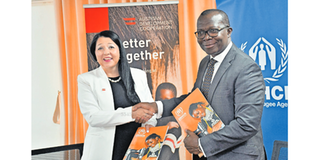UNHCR calls for long-term solutions for Uganda’s refugees

Dr Katja Kerschbaumer, the head of the Austrian Embassy Development Cooperation, and Mr Matthew Crentsil, the UNHCR representative in Uganda, during the announcement of a $2.8m donation towards the refugee response in Kampala City yesterday. PHOTO | UNHCR
What you need to know:
- Mr Crentsil said while there was heightened apprehension at the beginning of the year, several development agencies and donors have since responded positively, signalling good will to sustain the bulging numbers.
The United Nations High Commission for Refugees (UNHCR) Country Representative, Mr Matthew Crentsil, has expressed optimism that the refugee response in Uganda will be funded amid mounting concern of unprecedented shortfalls in funding.
Mr Crentsil said while there was heightened apprehension at the beginning of the year, several development agencies and donors have since responded positively, signalling good will to sustain the bulging numbers.
“…our apprehension at the beginning of the year, I am glad to say, is not the same as we speak today because of donors stepping up… That is why we can sustain support for the refugee programme up to now…we can at least sustain ourselves up to the end of the year and hopefully beyond that…Otherwise, by this time, we would have gone under the weather completely,” he said.
He was speaking at an event where the Austrian Development Cooperation announced a two-year donation of $2.8 million (Shs10.3b) towards improving water coverage and sanitation across refugee settlement camps.
The funds are to be handled by the UNHCR.
Dr Katja Kerschbaumer, the head of the Austrian Embassy Development Cooperation, who announced the donation reiterated her country’s commitment to support Uganda and agencies in the refugee response.
The beneficiary settlements include those in West Nile, southwest, and midwestern Uganda, which are facing significant gaps in the water and sanitation sector.
Water crisis
Water scarcity remains a major challenge in many refugee settlements across the country, with many queuing for hours to access water.
“The project is expected to assist 950,000 refugees and members of the host communities by increasing their access to clean water, proper sanitation and improved hygiene, directly improving their health, reducing susceptibility to water-borne diseases and consequently improving their lives,” Dr Katja said.
Despite Mr Crentsil’s optimism, and the boost by the Austrian government, gaps remain.
“At the beginning of the year, we projected requirements of about $343 million (Shs1.2 trillion) for UNHCR, but we got spending authority, in anticipation of donations coming in, of around $140 million (Shs317b) from our headquarters. As we speak now, we've received more than a third of that amount, over $100 million (Shs369b) have been contributed, which is very significant. Last year, around the same time, the funding was much less,” he said
“But it has not been very rosy… Over the years, the Uganda refugee response has been funded only about 30 percent to 36 percent, which is very low consistently over the years,” he added.
Mr Crentsil attributed the fall in funding to competing priorities and the emergence of new crises, citing the war in Gaza as a major diversion for many Western donors.
The Government of Uganda and the UNHCR both run separate interventions and budget lines in response to refugees who flock to Uganda.
Both are heavily sustained by donor funding that has over the years been dwindling.
Last week, officials in the Office of the Prime Minister expressed concern that the fall in donor funding is squeezing the government purse and affecting the welfare of the refugees.
Funding to the government, according to officials in the Office of the Prime Minister decreased $497m (Shs1.8 trillion) in 2018 to $143 million (Shs528 billion) in 2024.
“The deficit is being shouldered by Uganda, and given that scenario, in June we went around to European countries trying to mobilise funding to lift up the red line but it was not quite successful because they were talking about human rights abuse, that we are intolerant of the homosexuals…they are not ready to adjust their policies and some of the instruction they have given to financial institutions,” a senior minister said.
Dr Kerschbaumer said in the face of reduced resources and competing priorities, it is crucial to think long-term about the sustainability of the welfare of refugees.




